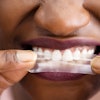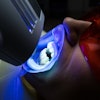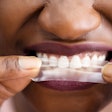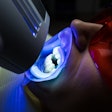Dear Cosmetic Dentistry Insider,
Orthodontists are quite familiar with the occasional hard-to-please patient. But some patients may be more than just difficult -- they could be suffering from a psychiatric condition known as body dysmorphic disorder (BDD), according to a study in the American Journal of Orthodontics and Dentofacial Orthopedics.
Mario Polo, DMD, an orthodontist who specializes in cosmetic treatments for high-profile patients, offers tips on how to identify and handle patients who may be suffering from BDD. Read more about BDD and how to address it in our latest Cosmetic Dentistry Insider Exclusive.
In other Cosmetics Community news, a study linking neurological damage with overuse of zinc-containing denture creams was allegedly delayed because of a reviewer who did not disclose he was a paid consultant for Procter & Gamble. But the reviewer in question claims the accusations are untrue. Read more.
And after the North Carolina State Board of Dental Examiners filed a lawsuit against the U.S. Federal Trade Commission (FTC) accusing the FTC of violating the U.S. Constitution in its attempts to keep the board from regulating teeth-whitening services, the FTC denied a motion by the board to dismiss the FTC complaint. And the case is still not resolved.
In other news, Align Technology has filed two lawsuits against ClearCorrect, one alleging that ClearCorrect is infringing Align clear-aligner therapy patents and the other alleging that the company is engaging in unlawful business practices.
Meanwhile, the Tennessee Board of Dentistry recently approved the use of Botox injections by oral and maxillofacial surgeons and is considering allowing general dentists to use the drug as well. Click here to read more.
On the clinical front, a sleep apnea expert is urging dental professionals to pursue proper diagnosis and management of problems associated with upper airway breathing passages to ensure that the brains of younger patients receive adequate oxygenation. Read more.
And research presented at the recent International Association for Dental Research meeting found that four different bleaching tray designs were equally effective in whitening teeth, while a study in the Journal of Translational Medicine demonstrated that diffuse reflectance spectroscopy could be used as a feedback mechanism to prevent iatrogenic nerve damage during oral and maxillofacial laser surgery.
Finally, the U.S. Food and Drug Administration is asking manufacturers of denture adhesives to take a more proactive role in informing consumers about the risks of zinc poisoning, and also ordering some manufacturers of temporomandibular joint implants to conduct postmarket studies of their products following numerous adverse event reports. Click here and here to read more.



















